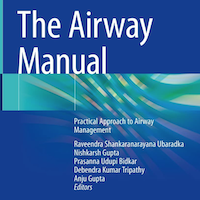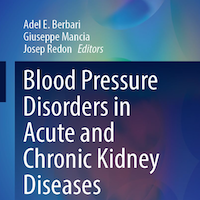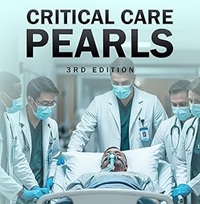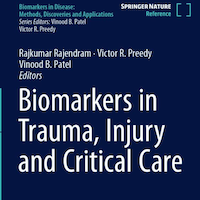Tag: ARDS
Balancing the Breath: Navigating the Brain-Lung Connection in Acute Brain Injury
This study explores the delicate tug-of-war between mechanical ventilation (MV) and outcomes for patients with Acute Brain Injury (ABI). The researchers highlight that the way we breathe for a patient can significantly influence... read more
Lung Ultrasound in the Critically Ill: The BLUE Protocol
Written by a pioneer in critical care ultrasound, this book discusses the basic technique and "signatures" of lung ultrasound and explains its main clinical applications. The tools and clinical uses of the BLUE protocol,... read more

Obesity Paradox or Myth? BMI Shows No Impact on Sepsis Survival in ICU Patients
This retrospective cohort study examined the association between body mass index (BMI) and clinical outcomes in 559 adult ICU patients with sepsis admitted between January 2021 and December 2023. Patients were categorized... read more
Refining Neuromuscular Blockade Use in ARDS
Acute Respiratory Distress Syndrome (ARDS) remains a critical challenge in medicine, persistently linked to mortality rates exceeding 30% despite extensive research over the years. The lack of effective drug treatments means... read more
Extracorporeal Life Support for Adults
This book presents a concise, evidence-based review of extracorporeal life support (ECLS) for adult diseases. It describes the use of ECLS with patients who are experiencing severe hypoxemic respiratory failure (ARDS and... read more

Reducing Mortality in Critically Ill Patients
This book describes the techniques, strategies, and drugs that have been demonstrated by multicenter randomized trials to influence survival in critically ill patients, defined as those who have acute failure of at least... read more

Monitoring Mechanical Ventilation Using Ventilator Waveforms
This book discusses the interpretation of mechanical ventilator waveforms. Each page shows a screenshot from a real patient and explains one or two messages. It starts with basic information about the waveforms and goes... read more

Steroids Save Lives in Severe Pneumonia and ARDS – Without Spiking Superbug Risk
A rigorous new systematic review and meta-analysis of 20 high-quality trials (3,459 patients) confirms that low-dose, short-course systemic corticosteroids significantly reduce short-term mortality in both severe pneumonia... read more
Mastering ICU Care: Algorithms and Clinical Decision-Making for Residents
This book covers all aspects of ICU care, from diagnostics and treatment modalities to patient management. It features real-world case studies and provides step-by-step guidance on critical care. Additionally, it discusses... read more

Lung Protection Saves Brains: Low Tidal Volume Tied to Lower Mortality
This international cohort study involving 1,510 patients with Acute Brain Injury (ABI) across 73 ICUs investigated the impact of Low-Tidal-Volume Ventilation (LTVV) on outcomes. In this group, where the most common etiology... read more
Survival Shockwave: VV-ECMO Outperforms VA-ECMO in Respiratory Failure
This meta-analysis comparing venovenous (VV-ECMO) and venoarterial (VA-ECMO) extracorporeal membrane oxygenation for respiratory failure, encompassing 3,598 patients across eleven studies, found a significant survival advantage... read more
Scarred Lungs: Identifying Fibrosis Risk After COVID-19 ARDS
This substudy of the large, multicenter RECOVIDS cohort investigated the predictive factors for developing fibrotic changes (FC) in survivors of COVID-19-related Acute Respiratory Distress Syndrome (ARDS) six months after... read more
Mechanical Ventilation in Emergency Medicine
This book discusses mechanical ventilation in emergency settings, covering the management of patients from the time of intubation until transfer to the ICU. It provides an introduction to key concepts of physiology pertinent... read more

Clinical Examination Skills in the Adult Critically Ill Patient
This well-illustrated book provides detailed guidance on all aspects of physical examination in patients requiring emergency or intensive care. After an introductory section covering basic principles and the recognition of... read more

Corticosteroids in ARDS: Delaying High-Dose Methylprednisolone Doesn’t Kill
This large retrospective study investigated whether starting high-dose (2 mg/kg) methylprednisolone therapy after 14 days of Acute Respiratory Distress Syndrome (ARDS) onset increased the risk of complications or mortality... read more
The Hidden Danger of Insufficient Sedation in ARDS
This prospective observational study highlights a critical issue in the Intensive Care Unit (ICU): a substantial number of patients with Acute Respiratory Distress Syndrome (ARDS) receiving continuous neuromuscular blockade... read more
Basics of Mechanical Ventilation
This book is a practical and easily understandable guide for mechanical ventilation. With a focus on the basics, this text begins with a detailed account of the mechanisms of spontaneous breathing as a reference point to... read more

The Beginner’s Guide to Intensive Care: A Handbook for Junior Doctors and Allied Professionals
Ideal for any medic or health professional embarking upon an intensive care rotation or specialism, this simple bedside handbook provides handy, pragmatic guidance to the day-to-day fundamentals of working in an intensive... read more

Predicting Mortality in Sepsis-Related ARDS Using Machine Learning
The application of machine learning methodologies to construct prognostic prediction models for sepsis patients complicated by ARDS, informed by the new global definition, proves to be reliable. This approach can assist clinicians... read more
Heterogenous Treatment Effect of Neuromuscular Blocking Agents for Moderate-to-severe ARDS
The systematic and short-term administration of cisatracurium in patients with moderate-to-severe ARDS appears to confer greater survival benefit in those with a higher baseline life expectancy. Further validation through... read more
Enhancing Early Mortality Prediction for Sepsis-associated ARDS Patients Using Machine Learning
This study utilized the MIMIC-IV, eICU CRD, and NWICU databases to construct and validate a machine learning model, SAFE-Mo, which predicts early mortality in patients with sepsis-associated acute respiratory distress syndrome... read more
Vitamin D Dynamics in Severe ARDS Patients on ECMO
This retrospective study investigated time-dependent changes in vitamin D levels and their correlation with disease severity and inflammation in 24 invasively mechanically ventilated patients with acute respiratory distress... read more








